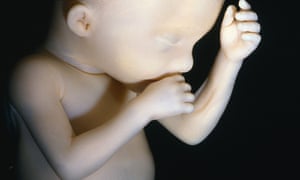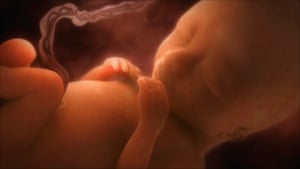The March of Science and Survival
"I want to make very clear that this device is not related to complete etogenesis -- never intended to be, will never be and it's just not likely to happen."
"It's a fantasy to think there's going to be this convergence of growing embryos and extracorporeal support."
"Half our kids in nursing homes with cerebral palsy are derived from extreme prematurity -- that's what this device is designed to address."
Alan Flake, fetal surgeon, Children's Hospital of Philadelphia
 |
| Dr. Alan Flake, left, is leading a team developing Biobag, or artificial womb, to help keep babies born severely premature alive. |
"You do need to get past things like, well [an early embryo] has no heart or other parts, but it's clear that at some level growing embryos in dishes will intersect the technology to keep embryos and fetuses alive artificially."
"That is absolutely inevitable and will happen."
"What makes you think they [parents] wouldn't want to spend a lot of money to grow their kids in an artificial incubator, presuming you don't rob them of some type of feedback from the pregnant mom that they need to grow well?"
"There will be people who say, 'it's just unnatural. That's just not the way God intended for us to have babies'."
Arthur Caplan, professor of bioethics, New York University's Langone Medical Center
"In the United States, in the year before last, we had over one million abortions. Now, imagine if states like Oklahoma mandated women who were getting abortions to put the fetus into an artificial womb.:"
"Let's say half kept the fetus after it was born and the other half didn't. Not only would we have a situation where many women who would like an abortion for reasons other than bodily autonomy couldn't get it. We would have an amazing number of babies."
Scott Gelfand, bioethicist, Oklahoma State University
"What we're really talking about now is, what happens after our voluntary moratorium on not culturing embryos past 14 days goes away? And how far backwards can you work from the Biobag and other functions to cover the entire spectrum of gestation?"
"We really don't know how long a conceptus can be cultured [in the lab] due to the moratorium. So, let's explore that limit."
"Ask the question: what would it take to increase the time that an embryo can be cultured from two weeks, to four weeks? I think we have the technology and knowledge to work through these challenges."
Dr. Roger Pierson, director, University of Saskatchewan Reproductive Biology Research Institute
 |
| A human foetus at approximately 20 weeks gestation. In recent decades the limit of viability for premature babies has been pushed back to about 23 weeks. Photograph: Medical-on-Line / Alamy/Alamy |
Imagine that there is consensus in the medical community and research supports this new way for medical science to ensure that premature babies are born healthy, enabled by this intervention to embark into a life with an assured health outlook through the medium of taking an early fetus and gestating it in a bag or a box, taking it to delivery as a healthy baby. New research has produced the concept of a "biobag", translucent, polyethylene sacks complete with synthetic amniotic fluid.
Researchers who developed the Biobag plan to test its efficacy soon on human babies, hoping this "extra-uterine" device will succeed in revolutionizing the treatment of extremely premature newborn babies, as a bridge between a natural womb and the outside world. To allow babies born at 23 to 25 weeks of gestation additional critical time for their organs to mature from fragile to capable.
This concept of an artificial womb might appeal to some as a way to free women from the tedium, discomfort and risks of pregnancy and childbirth. Single gay men might view the prospect as a gift, a surrogacy alternative. Two international teams succeeded recently in maintaining human embryos conceived through IVF alive in a laboratory for 12 to 13 days, surpassing the old record of nine days.
 |
| The biobag artifical womb is intended to improve the survival rates of premature babies. Photograph: Jellyfish Pictures/Getty Images/Science Photo Library RM |
In the hospital of today, neonatal care intensive units are able to save babies born within 22 or 23 weeks' gestation. These are babies so unready to live life outside the womb that their skin reveals translucent blood vessels. Pointing to the potential benefits of artificial wombs where ectogenesis translates as a tightly controlled, sterile environment where nutrients and hormones naturally required to produce optimal growth to maturity can be calibrated and monitored.
It is not unforeseeable that artificial wombs could change the biological process through social-medical engineering entirely. Leaving women to reproduce without risk to their physical, economic and social well-being. Planning time off work for complications related to pregnancy, and no nine-month finale of the body convulsing to produce a full-term baby. There are some who speak of a failure of psychosocial emotional ties between mother and baby without the traditional physical connection.
On the other hand, the perceived freedom that ectogenesis could deliver could also produce a situation where women are seen to be irrelevant in the production of the next generation. Aside from which there are those who postulate that this type of "immaculate conception" could lead to society reconsidering legal limits on a woman's right to abortion. Should a viable fetus be safely removed from a woman's body, some scholars envision a scenario where courts might consider women's right not to be pregnant through mandating ectogenesis.
 |
| An artificial womb could help keep babies born severely premature alive. |
Labels: Bioscience, Childbirth, Research

0 Comments:
Post a Comment
<< Home